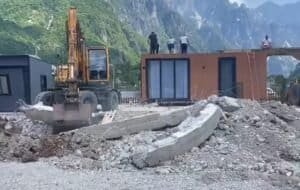In a country where politics has long been synonymous with self-interest, many Albanians looked to figures like Lapaj and Shabani as a chance to finally support something different — a civic movement built on values, merit, and collective vision. But as soon as the issue of electoral list placements surfaced, the unity collapsed.
🧩 From ideals to list-making: how fast it unraveled
What began as a project framed around citizen-led participation with no central leader, quickly broke down when the time came to assign positions on the candidate list. Shabani publicly accused Lapaj of unilateral decisions, lack of consultation, and political calculation. Lapaj, for his part, offered vague responses or remained silent.
For many supporters who were hoping for a new way of doing politics, this conflict felt like a betrayal. It revealed that even those with clean records and inspiring rhetoric may resort to the same habits they once condemned.
🧠 Is Lapaj really different from the politicians he criticizes?
If Shabani’s claims are true — that he was excluded without a process, a vote, or even a proper discussion — then Lapaj is not offering an alternative to old politics. He is simply repackaging it under a moral brand.
Ironically, Lapaj has spent years criticizing exactly this: centralized decision-making, lack of meritocracy, and the leader who controls everything behind closed doors. If he now engages in that same behavior, then what’s new about his vision?
⚖️ Without internal democracy, there can be no credible reform
How can someone advocate for political reform while ignoring the basic principles of internal democracy within their own platform? How can you speak of representation and inclusion when you exclude people through unilateral decisions?
Citizens are not asking for perfect leaders — but they are demanding honesty. And when someone preaches morality but behaves like every other political figure, the disappointment cuts even deeper. Because this time, it’s hope that’s being betrayed.
📉 A lost opportunity for real political alternatives?
This clash is not just a falling out between two individuals. It is a warning about what happens when structure, transparency, and shared power are missing from so-called new movements. When everything revolves around one figure, collapse is inevitable.
This situation forces Albanian citizens to confront a hard truth: real change will not come from those who fight to be at the top of the list, but from those who are willing to step back and build something lasting together.
📍 The public has every reason to be skeptical
If this is the new generation of Albanian politics, then public skepticism is not cynical — it is justified. Because maybe, the real change will come not from those who demand to lead, but from those who refuse to repeat the same old model.



